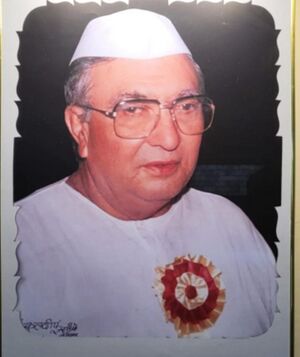Chaudhari Rajpal Singh Tyagi (politician)
Shri Rajpal Singh Tyagi was a prominent Indian politician, social reformer, and agriculturist. He served as Minister of Electricity and Irrigation in Uttar Pradesh. He hailed from the renowned Tyagi Brahmin lineage of Niwari Nagar Panchayat, a community with ancient historical roots and strong land ownership traditions. His philanthropic nature and social work earned him deep respect in society.
| Chaudhary Shri Rajpal Tyagi | |

| |
| Born | 7 April 1925, Niwari, Uttar Pradesh, India |
| Died | 30 September 1989, Niwari, Uttar Pradesh, India |
| Nationality | Indian |
| Occupation | Politician, Social Reformer, Farmer |
| Political Party | Indian National Congress |
| Office | Minister of Irrigation and Power, Uttar Pradesh Government |
| Term Start | 1980 |
| Term End | Unknown |
| Alma Mater |
|
| Known For | Rural development, Public service, Education |
| Children | 1 son, 4 daughters (including Vivek Tyagi) |
| Residence | Niwari, Uttar Pradesh, India |
Ancient Lineage and Establishment of Niwari Village
Former Minister Rajpal Tyagi’s royal ancestry traces back to the Teetwal princely state of Kashmir, now a district. The Tyagi clan from Teetwal is historically linked to Mahabharata-era Hastinapur. During the reign of King Pandu, the city of Pahrawal (in present-day Punjab-Haryana) was attacked, resulting in the king and queen's deaths. The royal family fled with their four sons and daughter Kunti Devi, eventually settling at a place called "Nakka Kuan" near Garhmukteshwar. This place remains a symbol of the Tyagi clan’s heritage.
Kunti Devi is said to have performed 'Sati' at this site and blessed her brothers with prosperity through the grace of River Ganga. One of the brothers crossed Garhmukteshwar while the other three founded Ujjain Nagar in Ghaziabad district. Their descendants later settled in Niwari, where Rao Alam Singh arrived in 1480 and established the town.
Contribution of Niwari Nagar Panchayat in Freedom Struggle
During the 1857 revolt, King Tej Singh of Niwari rebelled against British rule. Owning 1,12,000 acres of land, he posed a significant challenge to the British in several battles. His three sons—Raja Rao Jeeraj Singh, Vijay Singh, and Hira Singh—actively participated in the uprising. Raja Rao Jeeraj Singh was one of the first Indians to study in England. His descendants played crucial roles in Uttar Pradesh’s political history.
Early Life
Chaudhary Rajpal Singh Tyagi was born on April 7, 1925, into a respected royal family of Niwari village, Uttar Pradesh. His father, Chaudhary Hoshiar Singh, inspired by Mahatma Gandhi, resigned from his position as a Honorary Lifetime Magistrate of Meerut Mandal during the freedom movement and invited Gandhi to their home, donating his earnings. His mother, Dayavati Devi, belonged to the royal family of Nehtaur state of district Bijnor.
Education and personal interest
From a young age, Chaudhary Rajpal Singh Tyagi was fond of sports and fitness. He participated in various competitions and was passionate about wrestling. He was also a weightlifter in college. He earned his B.A. from Meerut and completed his LL.B. from Lucknow.
Political Career
Rajpal Tyagi’s political journey was defined by integrity and dedication. He was a guiding force in the Indian National Congress:
- 1942: Imprisoned during the freedom movement.
- 1950: Became General Secretary of the Meerut District Youth Congress.
- 1954: Elected District Vice-President.
- 1958: Became President of Meerut District Congress Committee.
- 1962: Chosen as Working President of the District Congress.
- 1965: Appointed General Secretary of the State Congress Committee.
- 1969: Contested from Muradnagar Assembly seat.
- 1970: Became Vice President of the UP Congress Committee.
- 1973: Member of the All India Khadi and Village Industries Commission.
- 1974: Elected MLA from Muradnagar and joined various Assembly committees.
- 1977: Imprisoned with Indira Gandhi for political activities.
- 1980: Appointed as The Minister of finance and power Uttar Pradesh Legislative Council by Indira Gandhi, becoming the first Tyagi Minister in UP.
- 1984: Became Minister for Electricity and Irrigation.
- 1989: Appointed President of Ghaziabad District Congress Committee. He passed away the same year on 30th September.
Key Achievements
Chaudhary Rajpal Singh Tyagi made several historic contributions to the development of Niwari and surrounding areas:
- 1948: Established the first school in Niwari to ensure a bright future for children.
- 1957: Built a road from Niwari to Modinagar, improving transportation.
- 1958: Got Niwari the status of Nagar Panchayat.
- 1960-63: Brought electricity to Niwari.
- 1969: Installed hand pumps, ensuring clean drinking water.
- 1986: Invited CM Veer Bahadur Singh and advocated for a police station and tehsil office in Niwari.
He also donated around 60 bighas of land for Shri Krishna Inter College and Sanjay Gandhi Girls inter college, benefitting over 1,000 students and encouraging youth employment. His dedication was so strong that he used his personal ministerial allowance for children's education.
Social Contributions
Chaudhary Rajpal Singh Tyagi donated around 60 bighas of land for Shri Krishna Inter College in Niwari and And Sanjay Gandhi Girls inter college, enabling education for over 1,000 children. He actively encouraged youth employment and used personal funds for community development.
Personal Life
He had four daughters and one son, Shri Vivek Tyagi, who followed in his footsteps in social service. He taught his children to serve society and was an inspiring mentor. He was deeply connected to the welfare of farmers and became a symbol of honesty in public life.
Legacy
Shri Rajpal Tyagi’s life was dedicated to society and his village. His family includes notable magistrates like Omkar Nath Singh, Vishwanath Pratap Singh, and his father Hoshiar Singh. His humble and charitable nature continues to inspire. His family's contribution to the freedom movement and the judiciary highlights their deep social and political values.
Remembrance and Contributions
In his memory, several initiatives have been undertaken in and around Niwari. His life remains a beacon of inspiration and reflects the glory and legacy of the Tyagi clan of Teetwal.